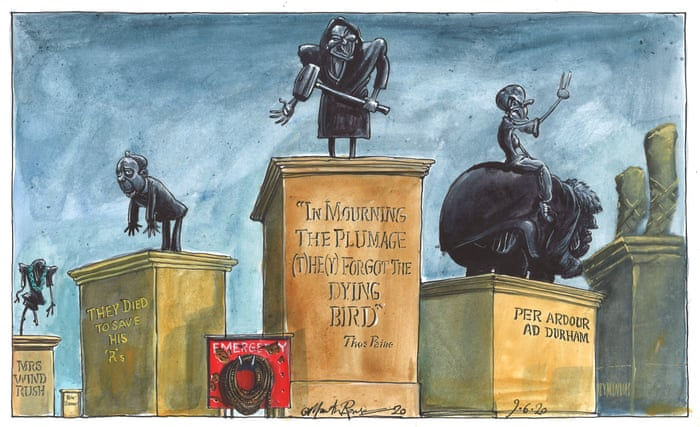- Charlotte Street Partners

- Jun 9, 2020
- 4 min read
Falling statues
Written by Scarlett Regan, Researcher
Edited by Kevin Pringle, Partner
Good morning,
I recently listened to Desert Island Discs with Professor Dame Elizabeth Anionwu, a former NHS nurse of Jamaican origin, who pioneered work in the understanding of sickle cell disease. After retiring, she spent nine years campaigning for a statue to be built of the ground-breaking nurse Mary Seacole. Erected just four years ago in 2016, it was the first statue of a named black woman in the UK.
By the very nature of the word, statues stand for something. The Edward Colston statue in Bristol, pulled down during this weekend’s Black Lives Matter protests, elevated someone who, whatever else, was a prominent seventeenth-century slave trader. During Colston’s time as director of the Royal African Company, more than 84,000 west African men, women and children were traded as slaves and transported to the Caribbean and America.
The removal of his statue has sparked angry debate. It was deemed “utterly disgraceful” by Priti Patel, the home secretary. Many have expressed a view that the statue was “an insult”, a “symbol that causes pain” and that its removal has been “empowering”. A petition to replace the Colston statue with one honouring civil rights campaigner Paul Stephenson has gained more than 26,000 signatures in the last two days.
Hopefully we can all agree that the debate, at least, has been a long time coming, and can play a part in deepening our understanding of the injustices of today as well as yesterday. Meanwhile, let’s ensure that the work of people like Elizabeth Anionwu and Mary Seacole are elevated in the public consciousness, and celebrated accordingly.
News
The plan for all primary school years in England to return to school before the end of term has been dropped by the UK government. It is no longer thought to be feasible, with many head teachers saying it had never been a practical possibility. Instead, schools will be given flexibility over whether or not to welcome pupils back before the holidays.
Increasing numbers of Britons are booking summer holidays abroad, despite the prospect of quarantine on their return. Ryanair said yesterday that it had seen a doubling of UK bookings to Mediterranean destinations compared to seven days earlier. It is believed that the Foreign Office will drop its advice against non-essential travel worldwide by the end of the month. (£)
Prime minister Boris Johnson has urged the country to “work peacefully, lawfully” to defeat racism. He admitted that the UK has more to do to ensure everyone was treated equally, and that the protests have revealed an “undeniable feeling of injustice”. However, he has warned that continued mass demonstrations endangered the country’s efforts to bring the virus under control.
Business and economy
The UK is to start its post-Brexit trade talks with Japan today, in an effort to agree a deal. Trade between the two countries totalled £31.4bn last year, and international trade secretary Liz Truss has said she hopes to build on this.
BP announced plans for cutting 10,000 jobs globally as it struggled with the fall in oil and gas prices. These cuts will largely affect office-based jobs, and will result in a reduction of around 15% in total employee numbers.
UK retail sales figures for May have raised some hopes for an economic rebound. Retail sales shrunk by 5.9% in May compared to the same month last year – much less severe than the 19.1% collapse in April. This relative improvement was a result in sales of food, clothing, beauty, office supplies, fitness equipment and bicycles, but is still the second largest contraction on record. A survey by Manpower revealed that 57% of employers expect a return to normal by May 2021. (£)
Columns of note
In The Times, Rachel Sylvester argues that carers of disabled children face “lockdown hell”. The duty on councils to provide support was downgraded in the emergency Coronavirus Act, leaving many families isolated and struggling. With almost 15% of all pupils having special educational need or disability, Sylvester calls for the government to intervene and offer help, specifically in easing the transition back to school and aiding home schooling. (£)
In the Financial Times, the Big Read today by David Crow explores how coronavirus has fuelled black America’s sense of injustice. Almost 22,000 black people have died from the virus in the US: that’s a quarter of overall deaths, even though they make up around 13% of the population. Financial concerns are more acute for black Americans too.

Source: The Times
Markets
The week ahead
US stocks erased all their losses for the year as a result of central bank stimulus and optimism amongst investors. The S&P 500 closed up 1.2%, above the level at the start of 2020. This comes after Friday’s surprising rise in UK employment figures.
The Dow Jones Industrial Average rose 1.7% after Boeing’s hopes of a rebound in air travel.
European stocks were quiet as Germany reported a historic 18% contraction in industrial output in May. Frankfurt’s Xetra Dax fell 0.2 per cent, matched by the FTSE 100.
What's happening today?
Finals
Aveva Grp
Big Yellow Grp
Cml Microsystem
McKay Secs.
Oxford Instrmnt
Schroder Real
Speedy Hire
AGMs
Albion. Dev Vct
Kazuki
Menhaden Plc
Nostrum Oil&gasS & U
Silence Ther.
Somero Enter Di
Final Dividend Payment Date
Globaldata
UK Economic Announcements
(00:01) Retail Sales
Int. Economic Announcements
(07:00) Current Account (GER)
(07:00) Balance of Trade (GER)
(10:00) Gross Domestic Product (EU)
(15:00) Wholesales Inventories (US)

Did you know?
The first sport to resume after the UK’s coronavirus lockdown was eased was competitive pigeon racing.
Parliamentary highlights
House of Commons
Oral questions Justice (including Topical Questions) Ten Minute Rule Motion Pedicabs (London) – Nickie Aiken Legislation Counter-Terrorism and Sentencing Bill: Second Reading Adjournment Kidsgrove Sports Centre – Jonathan Gullis House of Lords Oral questions Exercise Cygnus and preparations for responding to a major pandemic by the UK – Lord Hunt of Kings Heath Oral questions Discussions with the Local Government Association on promoting economic recovery after the COVID-19 pandemic – Baroness Quin Oral questions Establishing a public wealth investment fund to support businesses affected by the COVID-19 pandemic – Lord Haskel Oral questions Discussions with the Scottish, Welsh and Northern Irish Governments to coordinate a UK-wide approach to relaxing COVID-19 restrictions – Lord McConnell of Glenscorrodale Private Notice Question To ask the government what progress was made in securing a comprehensive trade and security partnership during the last round of negotiations with the EU – Baroness Hayter of Kentish Town Debate Conduct Committee Report ‘Remote voting and the Code of Conduct – Lord Mance Legislation Corporate Insolvency and Governance Bill – Second reading – Lord Callanan Statement Coronavirus “R” rate and lockdown measures – Lord Bethell Statement Public Order – Baroness Williams of Trafford Scottish Parliament Topical Questions (if selected) Ministerial Statement Reporting to Parliament on the Coronavirus Acts Scottish Government Debate COVID-19 Next Steps (Communities) Committee Announcements Business Motions

Comments